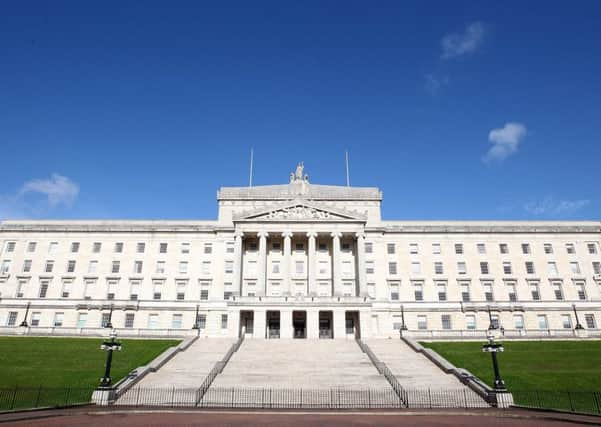Amid Brexit crisis, Stormont begins two-month holiday with no recall plans


Yesterday MLAs met in the Assembly chamber for the last time ahead of the summer recess and, having discussed the referendum on Monday, largely concentrated on other issues.
They are not due back in the chamber for more than 10 weeks, with the next plenary session scheduled for 14 September.
Advertisement
Hide AdAdvertisement
Hide AdIn fact, this year’s summer holiday is actually more than a weak longer than last year’s recess.
Last night the Assembly authorities highlighted that there is a mechanism for emergency sittings at any time – if either 30 MLAs or the First and deputy First Minister request a sitting.
There also appears to be no plan to cancel Civil Service leave – despite the huge task now ahead of officials and the limited time in which to undertake the work.
The Stormont Executive has already been criticised for failing to draw up a contingency plan for the possibility of a Leave vote – despite the main Executive party, the DUP, campaigning for that outcome.
Advertisement
Hide AdAdvertisement
Hide AdBy contrast, the Irish Government had produced a detailed contingency plan and published an eight-page summary of its key points on Friday.
The document deals with issues such as the implications in areas such as the border and trade, as well as its priorities for the negotiations which will take the UK out of the EU.
The role of the devolved administrations in the UK’s exit negotiations is not yet clear, but there are several areas where it is already clear that they will be impacted by what is to happen.
The most discrete issues affecting Northern Ireland are the nature of the Irish border and the impact on cross-border trade.
Advertisement
Hide AdAdvertisement
Hide AdSecretary of State Theresa Villiers has said that leaving the EU will mean significant powers which currently reside in Brussels – such as agricultural subsidies – will now be devolved, meaning that Stormont will have to form its own policy in those areas.
In the months before Thursday’s referendum, the House of Lords conducted a committee inquiry into the implications of a Brexit and produced a detailed report.
Similarly, the House of Commons’ Northern Ireland Affairs Committee conducted an inquiry into the implications for Northern Ireland and published a report earlier this year.
None of the Assembly’s committees conducted such an inquiry, seemingly assuming that either the Leave campaign could not win or that any implications of a British departure from the EU would be handled by London.
Advertisement
Hide AdAdvertisement
Hide AdOn Monday, during the Assembly’s emergency debate on the issue, the chamber was never more than two thirds full and at points was barely half full.
By contrast, in Westminster on the same day there was standing room only for the Prime Minister’s statement on the situation.
The News Letter asked Arlene Foster and Martin McGuinness’s department why the Executive has not already met for an emergency meeting, whether Executive ministers would be heading off on holiday as usual in coming weeks, whether annual leave across the Civil Service will be cancelled or curtailed over the summer due to the extent of the work now necessary and whether or not all senior civil servants’ annual leave will now be cancelled over the summer.
The Executive Office responded in a brief statement: “First Minister, Arlene Foster provided a detailed breakdown in the Assembly yesterday on the actions already underway in relation to the outcome of the referendum.
Advertisement
Hide AdAdvertisement
Hide Ad“Leave will be managed so priority business is progressed appropriately.”
In the Assembly on Monday, Arlene Foster had said: “The priority of the Executive will be to ensure Northern Ireland’s interests are protected and advanced and that new opportunities are developed as part of any new arrangements within the UK and the Republic of Ireland as well as with our European neighbours. We will seek to work with Executive colleagues to plan for the new realities and to maximise the benefits to Northern Ireland of this changed situation.”
Mrs Foster had said that she and Mr McGuinness are seeking an urgent meeting with the Prime Minister and that they will meet the Taoiseach on Monday.
She said that they had asked the head of the Civil Service to create senior teams in each department to consider “the potential implications for their department’s functions, legislation and regulations as well as identifying future challenges and opportunities”.
Advertisement
Hide AdAdvertisement
Hide AdMrs Foster said that there will also be civil service liaison teams working on an East/West, North/South and EU basis, and reporting directly to herself and Mr McGuinness She said that the chief executive of Invest NI will also establish a liaison group with business figures.
When asked if the Assembly is planning to return from its recess early, an Assembly spokeswoman said: “Following the referendum result, the Speaker made arrangements last Friday 24 June for the Business Committee to meet and add a debate to last Monday’s Order Paper to discuss the implications.
“Similarly, the Assembly will be able to respond to developments in the months ahead as required.
“While the work of ministers and Members in their constituencies will continue throughout the summer, should there be a requirement for the Assembly to meet in plenary during Recess, Standing Orders provide for either the First and deputy First Minister or 30 Members to submit a request to the Speaker. “If this occurs, the Speaker will be in contact with the Business Committee immediately to make arrangements for the Assembly to sit as soon as possible.
“Statutory Committees will make their own decisions as to when business requires them to meet.”